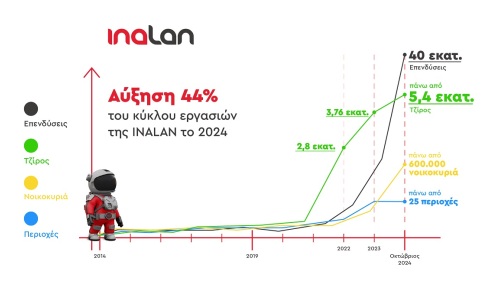
500,000 employees faced with salary reductions of up to 30%
500,000 employees faced with salary reductions of up to 30%
500,000 Greek employees are faced with the risk of direct wage reduction as next Thursday, February 14, 42 sectoral agreements will expire.

UPD:
500,000 Greek employees are faced with the risk of direct wage reduction as next Thursday, February 14, 42 sectoral agreements will expire. This means that companies will have the right to abolish bonuses, thus shrinking overall earnings. It is estimated that the reduction will be between 15% - 30%, that is in case a new sector contract is not signed. Either way there will be a margin of three months, the aftereffect, lest all sides reach an agreement. Alternatively, companies will be able to suggest signing new business or individual contracts with salary reductions.
Labor market experts estimate that after May about 1,100,000 workers (63%) will no longer be covered by the collective agreements and will be at the mercy of individual contracts, with the minimum wage of 586 euros as their only safety net. There is a widespread feeling that the contracts signed recently, which expire after the end of the aftereffect in October 2013, will not last long but will be violently terminated based on the new Troika laws.
The effect of the national general collective labor agreement expires on March 31, leaving about 350,000 workers hanging by a thread, as they will automatically lose the marriage benefit (10% of their salary), while also risking the loss of the time-bonus that enhances their salary by 58.6 euros every three years and today remains frozen until unemployment drops below 10%.
Starting on April 1st, the amount of the minimum wage will be set by the government through a cabinet Act, after consultation with the social partners and scientific institutions. The wage will be formed based on unemployment and economic competitiveness, figures that will remain fluid in Greece for the next decade. According to Labor minister Yannis Vroutsis the minimum wage, at least until 2014, will remain at 586 euros gross and there will be no further reductions.
Only 22 sectoral agreements will remain in effect from February 14.
Labor market experts estimate that after May about 1,100,000 workers (63%) will no longer be covered by the collective agreements and will be at the mercy of individual contracts, with the minimum wage of 586 euros as their only safety net. There is a widespread feeling that the contracts signed recently, which expire after the end of the aftereffect in October 2013, will not last long but will be violently terminated based on the new Troika laws.
The effect of the national general collective labor agreement expires on March 31, leaving about 350,000 workers hanging by a thread, as they will automatically lose the marriage benefit (10% of their salary), while also risking the loss of the time-bonus that enhances their salary by 58.6 euros every three years and today remains frozen until unemployment drops below 10%.
Starting on April 1st, the amount of the minimum wage will be set by the government through a cabinet Act, after consultation with the social partners and scientific institutions. The wage will be formed based on unemployment and economic competitiveness, figures that will remain fluid in Greece for the next decade. According to Labor minister Yannis Vroutsis the minimum wage, at least until 2014, will remain at 586 euros gross and there will be no further reductions.
Only 22 sectoral agreements will remain in effect from February 14.
UPD:
Ακολουθήστε το protothema.gr στο Google News και μάθετε πρώτοι όλες τις ειδήσεις
Δείτε όλες τις τελευταίες Ειδήσεις από την Ελλάδα και τον Κόσμο, τη στιγμή που συμβαίνουν, στο Protothema.gr
Δείτε όλες τις τελευταίες Ειδήσεις από την Ελλάδα και τον Κόσμο, τη στιγμή που συμβαίνουν, στο Protothema.gr
ΡΟΗ ΕΙΔΗΣΕΩΝ
Ειδήσεις
Δημοφιλή
Σχολιασμένα






































